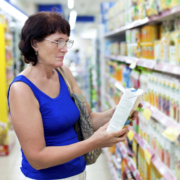Food fraud
There’s another kind of fraud on the rise and you’ll find it in your grocery store: food fraud. This can include deceptive labeling, the lack of food purity, and more.
Stay safe. Be Informed.
According to the U.S. Pharmacopeial Convention, a critically important entity protecting food and drug purity, the amount of fake ingredients has increased by 60 percent in the last year. Counterfeit foods range from lemon juice purporting to be “100% pure” to cheap oils, which are dyed and flavored for the purpose, being passed off as pricey extra virgin olive oil. NCL has done extensive work in this area to make sure that what you are buying is actually what you are getting.
The motive behind food fraud is obvious: economic gain. When ingredients and the products they are used in become pricey, there is much money to be made by unscrupulous producers. These activities hurt the honest businessmen in the industry but can also potentially harm the consumer. When a product has been adulterated and those ingredients are not listed on the label, consumers, particularly those with food allergies, no longer have the ability to necessarily avoid those ingredients that pose a threat. For example, cheaper oils, such as hazelnut, palm, and corn oil may be treated so that they can pass for live oil. This can prove a grave threat to those who are allergic to these products.
So, what can consumers do? Unfortunately, there aren’t foolproof steps to protect yourself from all food fraud. Less pricey categories of fish, for example, are often mislabeled as more expensive species. Even trained chefs, who handle the food every day, can be fooled and only DNA tests can reveal the substitution taking place. While there’s nothing a consumer can do to ensure they never consume fraudulent food, there are some common-sense steps they can take to mitigate the risk.
Here are some tips for savvy consumers:
- If a price seems too good to be true, you just might be on to something. There’s a reason that particular brand costs less than all the others, and there’s a chance that reason is adulteration.
- Pick brands that have a vested interest in keeping you as a consumer. They may have more of an incentive to stay honest.
- When possible, buy raw ingredients rather than processed ones. For example, buy your own coffee beans to grind rather than buying ground coffee.
- Speak out to your member of Congress, as well as the federal agencies, like the FDA, who work on these issues, know that food fraud is an important issue.







